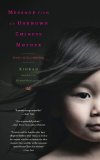Summary | Excerpt | Reviews | Beyond the Book | Readalikes | Genres & Themes | Author Bio

Stories of Loss and Love
by Xue Xinran
In the many years I have spent interviewing people in the course of my work, I have discovered yet another simple but very important reason why babies are abandoned: the combination of sexual ignorance and sexual freedom among young people. Looking back at the first decade of the economic reforms, it is clear that 1992 marked a turning point for China's urban population. Up until that time, educated city dwellers had been onlookers. Many even dismissed the reforms as yet another political movement. They looked down on migrants from the countryside who labored furiously to lift themselves out of absolute poverty; and they positively despised those former jobless vagrants who now prospered as small stall holders in cities and towns. In the 1980s, a "10,000-yuan-a-year family" was just another name for uneducated people who had made money through speculating. The educated were more cautious. It took a decade for them to wake up to the fact that, if they wanted to keep up, they must take their courage in both hands and grab the opportunities offered by the reforms. A great wave of young people soon swamped colleges and universities. Business became fashionable, and so did everything Western. And as far as young students went, the reforms appeared to find their most dramatic expression in "Westernized" relations between the sexes - there was a sudden surge in the number of young people living together without getting married. A friend of mine in China once lamented to me in a phone call that she no longer knew what social rules operated and what morality meant. "In our day," she said, "no one would dare even to have a private chat with a member of the opposite sex. Our parents would not kiss or embrace each other in front of the children! But now, my nineteen-year-old daughter changes her boyfriend every couple of months, and often stays out all night. She calls it sexual freedom and running her own life! I don't know anymore, are there any social standards left?"
I am not going to discuss here what social standards we ought to have (you can get my view from What Chinese Don't Eat). Judging the whole world by the same set of standards is ignorant and authoritarian. What I do want to talk about is those young people, my friend's daughter's generation, who grew up in the 1990s. They went from living in a society where traditional moral standards still prevailed, straight to adopting Westernized sexual mores. The problem was that many of them had had virtually no sex education or guidance: they lived a "sexless" existence within the family, at school, and in society. A combination of factors - sexual ignorance, the absence of sexual health programs, and hypocritical attitudes to sexuality among the older generation meant that when the young were suddenly exposed to Westernized sexual liberation and the new hedonism, the consequences were disastrous. Many young women knew nothing of contraception, or even how babies were made. The abortion business became a great way to make quick money, and advertisements for such services were plastered all over the outskirts of cities. Almost none of those students who now found themselves pregnant kept their babies. Chinese families fought over the boys, but the girl babies inevitably ended up in orphanages. This is probably one of the reasons for the dramatic increase in numbers of girl babies in Chinese orphanages from 1990 onward, and also for the 1992 government policy permitting international adoption.*
Of course, there are also other reasons why newborn infants are abandoned, and they are even more distressing and horrific. For instance, a soothsayer might predict that "it will spare the family trouble in the future"; and there are also folk beliefs that killing an infant will "avert natural catastrophes." Among many peoples, there are persistent beliefs that have been handed down by the elders of the community about abandoning babies.
Excerpted from Message from an Unknown Chinese Mother by Xue Xinran. Copyright © 2011 by Xue Xinran. Excerpted by permission of Scribner. All rights reserved. No part of this excerpt may be reproduced or reprinted without permission in writing from the publisher.
Censorship, like charity, should begin at home: but unlike charity, it should end there.
Click Here to find out who said this, as well as discovering other famous literary quotes!
Your guide toexceptional books
BookBrowse seeks out and recommends the best in contemporary fiction and nonfiction—books that not only engage and entertain but also deepen our understanding of ourselves and the world around us.